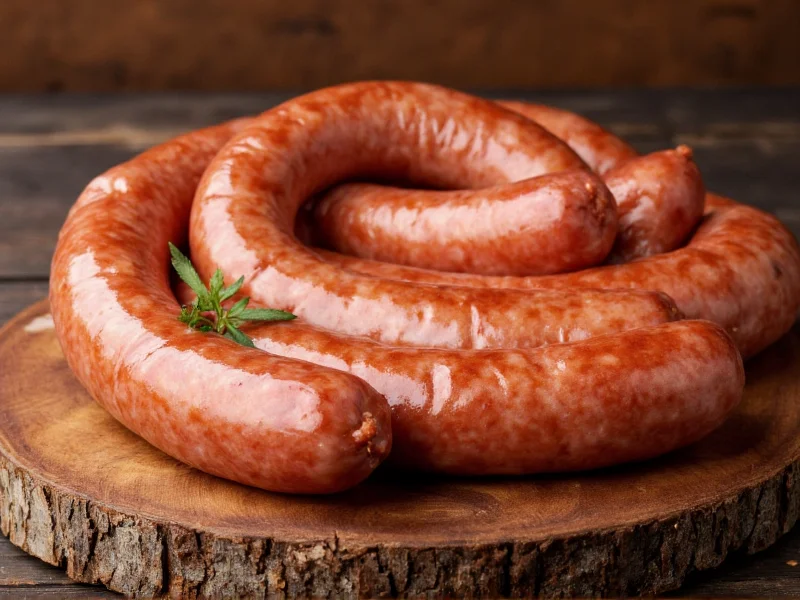When searching for another word for sausages, you're likely exploring linguistic alternatives that vary by region, culture, and specific sausage varieties. Understanding these distinctions helps avoid confusion in recipes, menus, or casual conversations across different English-speaking regions.
Common Synonyms for Sausages Across English-Speaking Regions
The term “bangers” remains the most recognized synonym in the United Kingdom, originating from World War I era when sausages contained so much water they would “bang” when fried. In American English, “links” commonly refers to individual sausage portions, especially breakfast varieties. For specific types, culinary professionals use precise terminology like “bratwurst” (German fresh sausage) or “andouille” (spicy Cajun sausage) rather than generic terms.
Regional Variations in Sausage Terminology
Sausage nomenclature differs significantly worldwide. Australians frequently use “snags” as casual shorthand, while Canadians might specify “peameal bacon” for a particular cured pork loin product often mistaken for sausage. In South Africa, “boerewors” denotes a distinctive coiled beef and pork sausage seasoned with coriander.
| Region | Common Term | Specific Context |
|---|---|---|
| United Kingdom | Bangers | Traditional pork sausages, especially with mashed potatoes |
| United States | Links | Breakfast sausages or hot dogs |
| Australia/New Zealand | Snags | Casual barbecue contexts |
| Germany | Wurst | Over 1,500 regional varieties exist |
Contextual Usage of Sausage Terminology
Professional chefs maintain precise terminology to avoid confusion. Calling all sausages “bangers” in a London restaurant would be accurate, but using the same term in Chicago might cause confusion. Food writers researching another word for sausages should consider:
- Culinary accuracy: “Chorizo” refers specifically to Iberian cured sausage, not generic sausage
- Menu writing: Upscale restaurants often use original language terms like “Merguez” instead of “spicy lamb sausage”
- Recipe clarity: Substituting “frankfurters” for “blood sausage” would dramatically alter dish outcomes
Historical Evolution of Sausage Terminology
The word “sausage” itself derives from Latin “caseus” (cheese) via Old North French “saussiche.” Many regional terms emerged from historical food preservation needs. During meat shortages in early 20th century Britain, sausages contained high water content that caused explosive frying – hence “bangers.” Understanding these origins helps explain why another word for sausages varies so dramatically across cultures.
When to Use Specific Sausage Terminology
Selecting the appropriate term depends on multiple factors:
- Geographic audience: Use “hot dogs” in North America, “frankfurters” in Europe
- Culinary precision: “Italian sausage” specifies fennel seasoning, while “chorizo” indicates paprika infusion
- Formality level: “Snags” works at backyard barbecues but not in formal culinary writing
Food historians note that precise sausage terminology prevents costly kitchen errors. A chef searching for another word for sausages in a traditional British recipe would need “bangers,” while interpreting a German menu requires knowledge of “weisswurst” versus “blutwurst.” This specificity matters whether you're writing a cookbook, translating menus, or simply ordering food abroad.
Frequently Asked Questions
Why are sausages called bangers in England?
British sausages earned the nickname “bangers” during World War I when meat shortages led manufacturers to add excessive water to sausage mixtures. When fried, the water would vaporize rapidly, causing sausages to burst or “bang.” The term stuck as part of British culinary heritage.
Is there a difference between sausages and links?
In American English, “links” specifically refers to individual sausage portions connected in a chain, particularly breakfast sausages. All links are sausages, but not all sausages are called links. The term emphasizes the connected form rather than the ingredients.
What's the proper term for vegetarian sausage alternatives?
Modern culinary terminology uses “plant-based sausages” or “vegetarian sausages” for meat alternatives. Some brands use proprietary names like “veggie links” or “soyrizo,” but professional kitchens increasingly adopt straightforward descriptive terms that specify ingredients.
Are hot dogs considered a type of sausage?
Yes, hot dogs are a specific type of sausage – technically a parboiled smoked sausage made from pork, beef, or poultry. While all hot dogs are sausages, not all sausages qualify as hot dogs. The term “frankfurter” refers to the original German version that inspired American hot dogs.
How do I know which sausage term to use in recipes?
Recipe terminology depends on regional origin and specificity needed. British recipes say “bangers,” German recipes use “bratwurst,” while American recipes might specify “breakfast links.” When adapting recipes, maintain the original term but consider adding clarification for your audience, like “bratwurst (German fresh sausage).”











 浙公网安备
33010002000092号
浙公网安备
33010002000092号 浙B2-20120091-4
浙B2-20120091-4